- Home
- Ernest Hemingway
Dateline- Toronto Page 18
Dateline- Toronto Read online
Page 18
The last premier had some vague plan for selling all the national art treasures, renting out the museums and mortgaging all the government property to get money. Schober stopped this as he stopped the Monarchist-Socialist fight and went down to business on getting credit for Austria. The result is that credits have been granted that have started Austria back on to her feet again, and for the first time the financial situation of the Austrian republic shows a ray of hope.
The Unworldly Russians
The Toronto Daily Star
April 27, 1922
GENOA.—The Russian envoys at Genoa look, talk and act like businessmen and yet there is a strange, unworldly something about them.
Tchitcherin, the head of the delegation, has a weak, indefinite sort of face that gains no character from his thin beard, and while he talks in his hissing, purring voice he is not at all impressive. Yet when you read his speech later and analyze it, you see how the points are jabbed home with rapier-like clarity. Tchitcherin’s mind, when he talks, seems to come down from some Marxian heaven that looks down through the mezzanine of H. G. Wells’ heaven to the earth far beneath. The earth looks very small, but very clear to Tchitcherin.
Joffe, with his narrow sod-spade beard, Krassin of the immaculate Van Dyke, Litvinoff with his big, blond, smooth Russian face all have this air of detachment—but all have it in a less degree than Tchitcherin. It is the sort of look that you saw on the faces of men who had been in the war so long that it had ceased to exist, a sort of exaltation of personality above their daily world.
The exception to this impressiveness of the Russians is Rosenberg, a small, nervous, hysterical and suspicious man who is in charge of the Russian press service. Now I am not anti-French, anti-Semitic, or anti-any nationality as far as I know. Neither am I pro-Bolshevik, pro-Irish, pro-Italian or have any special pros. I am trying to write an impartially observed account of the conference, untinged by propaganda of any sort. And I say if the Russians lose or have lost the sympathy of public opinion that they gained when they offered disarmament of Russia on the first day, it will be because of the utter lack of judgment and the complete lack of any grasp of the situation of their relation with the press.
Newspapermen in crowds make the long, all-day trip out to Rapallo and Santa Marguerita. They either go in motorcars and are choked with dust or sit in a dirty train that goes through some thirty tunnels as it follows the ocean shore. When they get to the Russian headquarters at the Imperial Hotel at Santa Marguerita the chances are more than even that the Russians refuse to see them.
The other day I waited an hour, being eyed with intense suspicion by the guards and submitted to a cross-examination, until Rosenberg finally sent down word he would not receive us. It was all right with me. I will continue to report impartially, but some of the other correspondents said, “All right, we’ll roast them tonight for that. They’ll find out if that is the way to treat the press.” And the trouble is that the opinion of the world is made by those same correspondents.
Correspondents of the Communist papers like the Daily Herald of London and Humanité of Paris have begged Rosenberg to adopt a different attitude, but he is a small, weak, frightened man, with a job too big for him, and as a result the Russians suffer. It is a very big bet that the Soviet government is overlooking, and the reason for its being overlooked is this unworldly detachment of the heads of the Soviet delegation.
German Delegation at Genoa
The Toronto Daily Star
April 28, 1922
GENOA.—Germany’s position at the Genoa Conference is a very difficult one. She did not want to come to Genoa as she believed that she had nothing to gain and everything to lose. She believed that M. Poincaré’s flat statement that France would have nothing to do with the conference if the question of reparations was brought up, or the revision of the Versailles treaty raised, killed any good Germany might get from Genoa.
Dr. Chancellor Wirth’s speech at the opening session was a masterpiece of tact and kindliness—but it did not say anything. It merely meant that the Germans had come to make a good impression by their behavior, to hope for the best and expect the worst, and perhaps through the aid of the neutral countries to try and obtain a reduction of reparations. France says she will leave the conference if the question is raised—so there you are.
It is very significant that there is no representative of Hugo Stinnes, the sinister peacetime kaiser of Republican Germany, on the commission. Walter Rathenau, who is an enemy and business rival of Stinnes, is one of the heads of the German delegation and his presence may explain the fact that Stinnes is absent.
Another explanation is that it would be very hard for the conference to put up with Stinnes. He so completely destroys the illusion that is being built up by the sentimentalists of Germany as a sweet, friendly long-suffering and forgiving country. It is very hard for that picture to hold together when Hugo Stinnes is around. He, the most powerful factor in Germany today, seems to spoil the picture somehow. It invariably embarrasses the present crop of Germanophiles when Stinnes’ name is mentioned. They want to forget him.
Hugo Stinnes is the industrial dictator of Germany today. He has a Lord Northcliffe hold on the press also and when he snaps the whip the editors jump through the hoop. He is one of the richest men in the world and he is a valuable asset to France in that he is making Germany work—and if she works she can pay. But he is not kindly, forgiving, Christian or sentimental.
It was Stinnes who made the plan for the destruction of the industries of northern France and who advocated the creation of a zone of complete industrial devastation of the manufacturing part of France. With a complete attitude of detachment, or even with a pro-German view, it is not nice to picture what Stinnes would have done to France if Germany and not France had been the victor in the war.
So they are keeping Herr Hugo Stinnes with his black derby hat and his ready-tied neckties, his celluloid collar and the meanest face in Europe well out of the Genoa Conference. It seems the better plan.
Germany is represented by the kindly, south German Dr. Wirth and the coldly intellectual Rathenau with his polished billiard-ball head—but somehow the shadow of Stinnes passes over occasionally and gives you the same sensation as seeing the black eagle on the flag that hangs over the German consulate at Genoa.
A Hot Bath an Adventure in Genoa
The Toronto Daily Star
May 2, 1922
GENOA.—Lloyd George says that conferences are cheaper and better than war, but, as far as I know, Lloyd George has never been blown up by an exploding Italian bathroom. I just have been. That is one of the numerous differences between us.
A bursting bathroom is a singularly annoying thing. You feel so completely exposed to the whole affair. I do not mind being blown up in the trenches so much; it has its good side, you leave the trench and go to a hospital, you convalesce, you even swank about a bit. But a bursting bathroom is bad. You are going to leave the bathroom anyway in a few moments, the wounds do not come as a relief, they are only an indignity—and the end of the whole business is that you have to go right on working.
I entered my bathroom with a warm feeling of anticipation and a kindly love of Italy and the Italians. I left it in a scald of realization, hating everything Italian from Garibaldi to D’Annunzio.
It was a warm deep bath and the gas roared merrily under the big copper tank-heater that projected from the wall. I lay back and soaped merrily. To improve the story, there should be a long line of preliminaries. But there were not. It is a short story.
Suddenly the heater began to hiss and sputter. Then there rushed out a great strangled whish of steam like the last rush of an incoming shell and without further formality, the heater exploded. The shock of the explosion lifted me out of the tub as though on a solid wave, and flung me against the door. A roaring cloud of steam filled the room, and in all the clothes one wears in the bathtub, I flattened myself against the door, like a starfish on a rock, and finally got
the key to work.
In passing from the tub to the door on that solid shock wave, it seems I had been smashed through—or over—an enameled foot tub and a chair. The proof was furnished by an eight-inch gash in my right shin and a long, rapidly greening bruise on my left hip. My right wrist was sprained where it struck the door, when I was flattened against it, and most of the skin was gone from the palm of the hand. The bottom of the copper heater had blown out.
A porter dove into the steam and choked off the heater and some other minor functionary wrapped me in an enormous towel. The wave of the explosion had driven all the breath out of my lungs and I could not talk above a whisper. But I whispered as emphatically as possible.
The owner of the hotel arrived and I started whispering to him in Italian.
“Do you speak French?” he said.
“A little.”
“Ah then, we will converse in English.” He waved his hands. “Monsieur has been discommoded?”
“Do I look happy?” I whispered, putting on the bathrobe.
“But monsieur should be happy. He might have been killed. Monsieur is a fortunate man!” He beamed.
“In this hotel, is a guest who is not killed by the exploding bathrooms fortunate?” I whispered very bitterly.
“Yes, monsieur, you might have been killed. You are very fortunate.” He shrugged his shoulders.
“And the leg?” I asked. “It too is fortunate?”
“Yes, yes, monsieur. It might be so much worse. I will send for some iodine.” He was gone without my having seen him go.
Later the boots explained to me that the accident was quite unavoidable. “You see, signor,” he explained smilingly, in Italian, “the boy who makes the baths placed a small cork, a very old cork, in the siccura, the safety valve. By this the water heats much more quickly. We do this always. The boy—is a very nice boy—simply forgot to take the cork out. The safety lever remained jammed.” He smiled charmingly and finished, “As the signor sees, it was absolutely unavoidable.”
Now I am waiting to see if the bottle of iodine that the proprietor ordered will appear on my bill.
Well-Guarded Russian Delegation
The Toronto Daily Star
May 4, 1922
GENOA.—Regardless of what they have or have not accomplished, the hardest-working delegation at Genoa is the Russian.
Night after night after the regular sessions, “conversations,” or committee meetings are over, and the delegates of other nations, in evening clothes, are sipping at their liqueurs or listening to the orchestras at their various hotels, the Russians gather around a round table in an upper room of the Hotel Imperial at Santa Marguerita discussing, studying, poring over masses of documents and figures until three or four o’clock in the morning.
There is always an air of mystery about the Soviet delegation. This was first created by the manners and methods of the Italian secret police who are charged with guarding the delegates. The Soviets had exacted strict guarantees from the Italian government before they consented to come to Genoa and after they came the Italians certainly saw that their safety was guarded. In fact, the guarding was so thorough, complete and uncompromising that the Russians wearied of it after about one day and would have given a good deal not to be so strictly hedged about.
Italy’s first move to guard the Soviet representatives was to give them, as living quarters, the Imperial Hotel at Santa Marguerita. It has large, steeply walled grounds and the walls are so far from the hotel itself that it would take a Babe Ruth to chuck a bomb over. There is no doubt but that the Imperial is a fine safe place but it is located so far from Genoa that at least four hours a day are wasted going to and from the various meetings.
After the Italians had lodged the Russians out at Santa Marguerita, they put so many carabinieri (royal military police) around the hotel, gardens and entrances that a mouse couldn’t get into the Imperial. Then, at the one entrance permitted at the foot of a steep winding drive they stationed a commissioner of secret police that would keep St. Peter outside of the pearly gates if there was a single flaw in his papers, and what is more, make him feel that he had no right in heaven at all and would be lucky if he escaped without being arrested.
The commissioner has the manners of a Congo overseer, suntanned, thinly bald head, the most sinister face I have ever seen and one stock remark delivered in Italian: “Those papers are no good!” Occasionally he will unbend and tell you that there is no one in the hotel, that he doesn’t know when they will get back or where they have gone, that he can tell you nothing, that he has no idea when the trains run, and that there is no use waiting to see anyone. That is when he is cheerful. He usually simply tells you that your papers are no good and will you please stay outside the gate?
I finally got hold of the cheka, or Russian personal bodyguard, a dark, cheerful-faced young Russian with a disarming grin, who drifts through the rooms and the luxurious gardens of the Imperial, a normal-looking, handsome young shadow with a flat bulge in his trousers pocket where the cloth tightens over his automatic pistol.
“It is impossible to get past those Italian secret police to get at the news up here,” I told him as he listened smiling. “I want some sort of a pass to admit me at the gate so that when I make the long trip out I won’t have to stand down there for two or three hours and then be turned away. I want to tell Canadians the truth about you and your delegation. I’m not a propagandist and you should be willing to let me get at the truth. I don’t want to guess at the truth from outside the walls and I am sure you don’t want me to.”
He smiled and went away. In a little while he was back with a blue card. It read, in Italian:
No. 11
Russian Delegation
at the Genoa Conference.
Testimony of personal recognition
free ingress to the Hotel Imperial,
seat of the Russian delegation in St. Margherita
is given to
ERNEST HEMINGWAY
_____________________________________
journalist_______for________permanent_______
St. Margherita_______________________1922
signed
Head of the Internal Service
of the Delegation
* * *
German Journalists a Strange Collection
The Toronto Daily Star
May 8, 1922
GENOA.—If it is true that the funnier-looking a newspaperman is the better work he does, there were some world-beaters at the Genoa Conference.
Applying the same rule, the Germans must be the greatest newspaper people on earth. Continuing under the same assumption, there is one German journalist who must be so good that it is a shame for him to take the money. That man haunts me still. At that I would rather he haunted me still than made any noise about it.
In the Casa della Stampa, literally translated as House of the Press, where some 300 journalists and twice that many camp followers of the press pounded child-sized typewriters, stood up to the bar, looked over one another’s shoulders, asked one another, “Whadja hear at the Hotel de Genes?” and argued and swore at the Italian telegraph operator as they breasted the long counter that looked much more like a bar than the bar did—this particular German stood out like Paderewski’s head in a bunch of ostrich eggs.
He had red hair, as red as a burning hemlock tree, a pale, wan, drawn face and he wore knickerbockers. No matter what happened—whether it was the German-Russian treaty explosion that set the correspondents in rows in front of the telegraph counter like travelers at a quick-lunch station during a five-minute stop; or the Allies’ reproof of Germany that nearly broke up the conference and started typewriters clicking like Helen of Troy launching ships—this cadaverous, flaming German stood wanly aloof. He was above the battle, above interest, above everything. I only heard him speak once—and his voice was exactly like a peacock’s.
Whatever type of German journalism he represented, its extreme opposite was present in t
he person of Theodore Wolff, editor of the Berliner Tageblatt. Wolff, gray-haired, with protruding lips, a permanent scowl and a mustache that still turned up in spite of close cropping, scowled away at telegraph blanks all day long and wrote rapidly in a tiny, microscopic fist. Wolff’s snarling efficiency though was offset by the receding-faced German correspondent and the bobbed-haired German correspondent.
The receding-faced German had a face that turned in like a pancake that has had a fist pushed into it. He wore steel-rimmed spectacles and peered around nearsightedly. As I was coming upstairs from the telegraph office with a copy of the Russian-German treaty in my pocket, he peered at me anxiously. “Well, what do you know?” he asked. “Nothing but the treaty,” I answered.
“But the treaty is not given out till tomorrow,” he said. “I can promise you that. It is direct from our delegation.”
When I showed him the treaty, which had been given out in mimeographed form by the Russians and which the English correspondents had been busy analyzing and dissecting for two hours past, he said mournfully, “Just think of that. Our delegation is wrong again!”
The bobbed-haired German had bobbed hair. It was cut like Molla Bjurstedt’s, with a bang in front, and he wandered fatly around, fat-cheeked, fat-bodied and fat-headed. No doubt he was harmless; but it was very hard on newspapermen who were concentrating on an article in the overcrowded, noisy press room of the Casa della Stampa to look up and suddenly see either the thin, flaming, obviously dying-on-his-feet German; the German with the beat-in face and the peering look, or the fat German with the bobbed hair, directly in front of their typewriters.

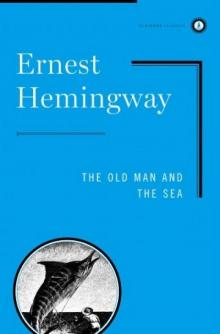 The Old Man and the Sea
The Old Man and the Sea Green Hills of Africa
Green Hills of Africa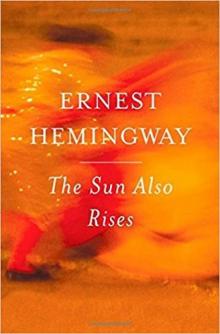 The Sun Also Rises
The Sun Also Rises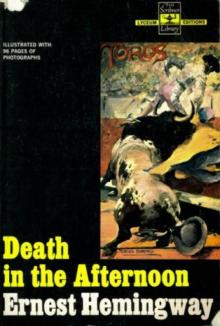 Death in the Afternoon
Death in the Afternoon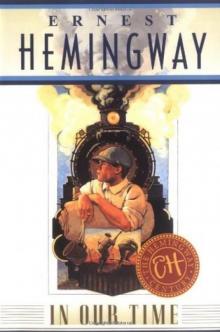 In Our Time
In Our Time For Whom the Bell Tolls
For Whom the Bell Tolls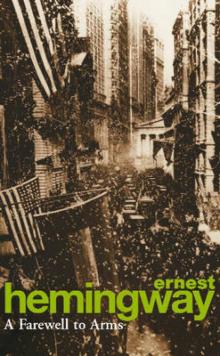 A Farewell to Arms
A Farewell to Arms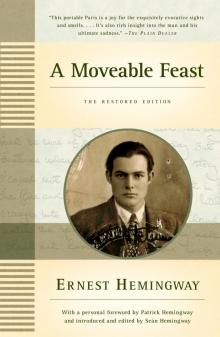 A Moveable Feast
A Moveable Feast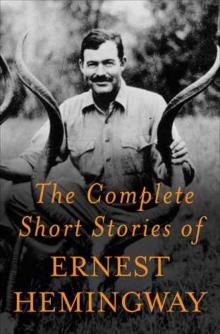 The Complete Short Stories of Ernest Hemingway
The Complete Short Stories of Ernest Hemingway Big Two-Hearted River
Big Two-Hearted River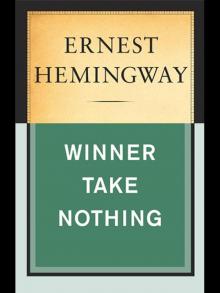 Winner Take Nothing
Winner Take Nothing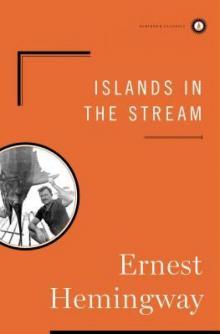 Islands in the Stream
Islands in the Stream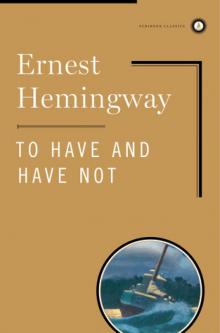 To Have and Have Not
To Have and Have Not The Snows of Kilimanjaro and Other Stories
The Snows of Kilimanjaro and Other Stories Across the River and Into the Trees
Across the River and Into the Trees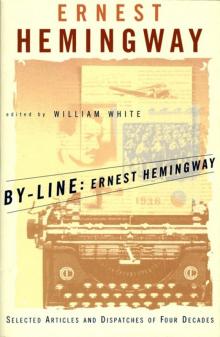 By-Line Ernest Hemingway
By-Line Ernest Hemingway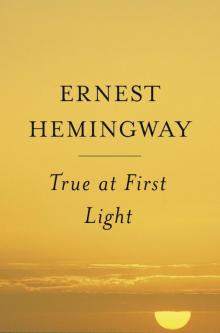 True at First Light
True at First Light Men Without Women
Men Without Women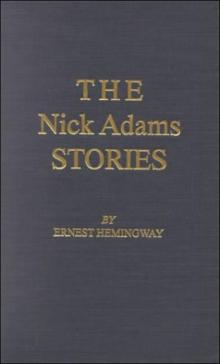 The Nick Adams Stories
The Nick Adams Stories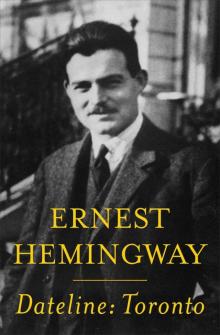 Dateline- Toronto
Dateline- Toronto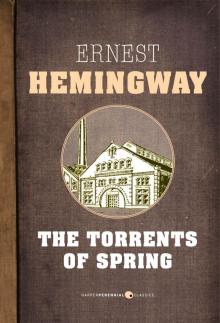 The Torrents of Spring
The Torrents of Spring Short Stories
Short Stories